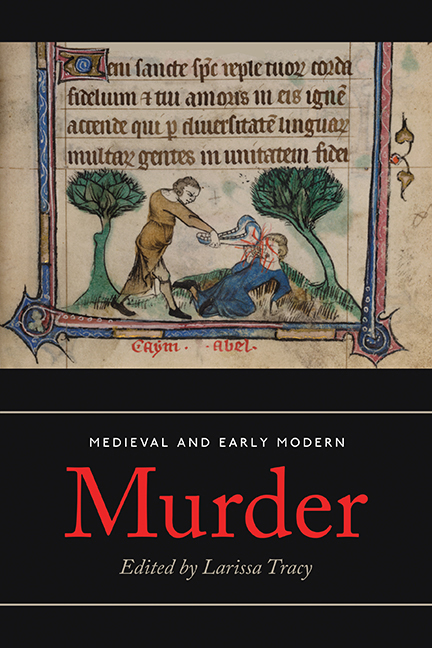Book contents
- Frontmatter
- Contents
- List of Illustrations and Tables
- Acknowledgements
- Contributors
- List of Abbreviations
- Introduction: Murder Most Foul
- I Murder on Trial: Justice, Law and Society
- II The Public Hermeneutics of Murder: Interpretation and Context
- 6 Bringing Murder to Light: Death, Publishing and Performance in Icelandic Sagas
- 7 ‘I Think This Bacon is Wearing Shoes’: Comedy and Murder in the Old French Fabliaux
- 8 ‘Chevaliers ocirre’: Manslaughter, Morality and Meaning in the Queste del Saint Graal
- 9 Murder, Manslaughter and Reputation: Killing in Malory's Le Morte Darthur
- 10 Poisoning as a Means of State Assassination in Early Modern Venice
- 11 Defamation, a Murder More Foul?: The ‘Second Murder’ of Louis, Duke of Orleans (d. 1407) Reconsidered
- 12 ‘A general murther, an universal slaughter’: Strategies of Anti-Jesuit Defamation in Reporting Assassination in the Early Modern Period
- III Murder in the Community: Gender, Youth And Family
- Conclusion
- Select Bibliography
- Index
10 - Poisoning as a Means of State Assassination in Early Modern Venice
from II - The Public Hermeneutics of Murder: Interpretation and Context
Published online by Cambridge University Press: 05 July 2018
- Frontmatter
- Contents
- List of Illustrations and Tables
- Acknowledgements
- Contributors
- List of Abbreviations
- Introduction: Murder Most Foul
- I Murder on Trial: Justice, Law and Society
- II The Public Hermeneutics of Murder: Interpretation and Context
- 6 Bringing Murder to Light: Death, Publishing and Performance in Icelandic Sagas
- 7 ‘I Think This Bacon is Wearing Shoes’: Comedy and Murder in the Old French Fabliaux
- 8 ‘Chevaliers ocirre’: Manslaughter, Morality and Meaning in the Queste del Saint Graal
- 9 Murder, Manslaughter and Reputation: Killing in Malory's Le Morte Darthur
- 10 Poisoning as a Means of State Assassination in Early Modern Venice
- 11 Defamation, a Murder More Foul?: The ‘Second Murder’ of Louis, Duke of Orleans (d. 1407) Reconsidered
- 12 ‘A general murther, an universal slaughter’: Strategies of Anti-Jesuit Defamation in Reporting Assassination in the Early Modern Period
- III Murder in the Community: Gender, Youth And Family
- Conclusion
- Select Bibliography
- Index
Summary
There was a king reigned in the East
There, when kings will sit to feast,
They get their fill before they think.
With poisoned meat and poisoned drink.
He gathered all that springs to birth
From the many-venomed earth;
First a little, thence to more,
He sampled all her killing store;
And easy, smiling, seasoned sound,
Sate the king when healths went round.
They put arsenic in his meat.
And stared aghast to watch him eat;
They poured strychnine in his cup
And shook to see him drink it up:
They shook, they stared as white's their shirt:
Them it was their poison hurt.
– I tell the tale that I heard told.
Mithridates, he died old.
– A. E. Housman, ‘Terence, this is stupid stuff’, from A Shropshire Lad (1896)POISONING IS NOT A SUBJECT that medieval and early modern legists were reluctant to discuss, and it is mentioned at length in so authoritative a source as the Justinianic Digest, in Chapter 48.8, Ad legem Corneliam de sicariis et veneficiis [Pertaining to Sulla's Law Concerning Murderers and Poisoners]. In medieval Venice, an emporium for herbs and spices for far-flung realms, it was a matter of ethics (not unlike the Hippocratic Oath) that learned herbalists would not administer poisons for any reason. In this period, Venice's speziari, those responsible for mixing herbs and spices in salutary ways to help palliate human ailments, had regulations drawn up for them, just as other guildsmen did. The earliest one that survives is a Capitulary (1268), with separate sections for physicians and for pharmacists, by the Giustizieri Vecchi. Regulation VIII for pharmacists read, ‘Item, non dabo neque dari faciam neque docebo aliquem aliquam medicinam venenosam seu abortivam dare’ [In addition, I shall not give, nor cause to be given, nor shall I instruct someone to give someone any poisonous or abortifacient compound]. Specific political events sometimes dictated legislation on the subject. The Barbo poisoning of 1410, in which a Tatar slave girl was thought to have poisoned her master with arsenic, led to a law dated 22 June 1410 outlawing the sale of eight toxic substances: napellum, opium, cantharides, ‘worms of Caffa’, the arsenic ‘curinum’, arsenic sublimate, silver sublimate and red arsenic by all but two tightly-overseen pharmacies in Venice, that of Due Rughe [Two Wrinkles] and that of San Giuliano on the Rialto.
- Type
- Chapter
- Information
- Medieval and Early Modern MurderLegal, Literary and Historical Contexts, pp. 227 - 253Publisher: Boydell & BrewerPrint publication year: 2018



